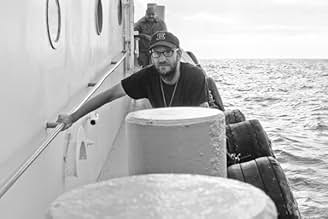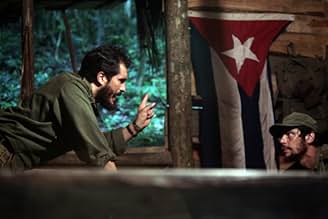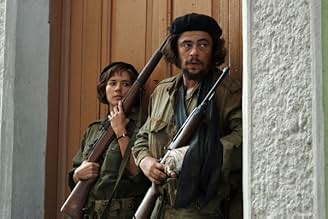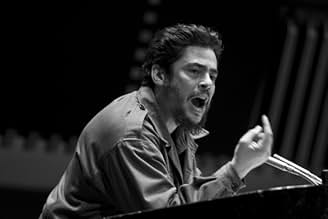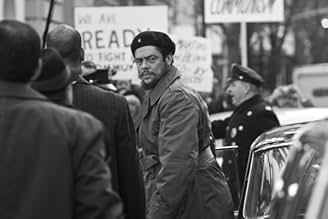In 1956, Ernesto 'Che' Guevara and a band of Castro-led Cuban exiles mobilize an army to topple the regime of dictator Fulgencio Batista.In 1956, Ernesto 'Che' Guevara and a band of Castro-led Cuban exiles mobilize an army to topple the regime of dictator Fulgencio Batista.In 1956, Ernesto 'Che' Guevara and a band of Castro-led Cuban exiles mobilize an army to topple the regime of dictator Fulgencio Batista.
- Awards
- 4 wins & 13 nominations
Oscar Isaac
- Interpreter
- (as Óscar Isaac)
María Isabel Díaz Lago
- María Antonia
- (as María Isabel Díaz)
Demián Bichir
- Fidel Castro
- (as Demian Bichir)
Ramon Fernandez
- Héctor
- (as Ramón Fernández)
Yul Vazquez
- Alejandro Ramírez
- (as Yul Vázquez)
Jsu Garcia
- Jorge Sotús
- (as Jsu García)
Luis Alfredo Rodríguez Sánchez
- Rebel Messenger #1
- (as Luis Rodríguez Sánchez)
Roberto Santana
- Juan Almeida
- (as Roberto Luis Santana)
- Director
- Writers
- All cast & crew
- Production, box office & more at IMDbPro
Storyline
Did you know
- TriviaFor his role, Benicio Del Toro spent seven years researching Guevara's life.
- GoofsWhen the guerrilleros are in the Sierra Maestra, we can hear the coqui (Eleutherodactylus coqui) singing in the night. However, this small frog is endemic to Puerto Rico and the Virgin Islands, thus not possible to be heard in Cuba.
- Quotes
Lisa Howard: What is the most important quality for a revolutionary to possess?
Ernesto Che Guevara: El amor.
Cuban Diplomat #1: [translating] Love.
Lisa Howard: Love?
Cuban Diplomat #1: Love of humanity... of justice and truth. A real revolutionary goes where he is needed.
- ConnectionsFeatured in Así se hizo - Che El Argentino (2008)
- SoundtracksBasura
Written and Performed by Mark A. Mangini (as Mark Mangini)
Featured review
Che Part One is an interesting and enjoyable film about the Cuban revolution, that focuses on the infamous Ernesto 'Che' Guevara. The story follows Che from his first meeting with Castro, to the climactic battle in Santa Clara, where Batista's army makes its last stand against the revolutionaries.
This battle scene is filmed guerrilla warfare style in an urban environment, with short bursts of action followed by silence as soldiers move into newer/better positions. It all feels very tense and realistic, which makes a nice change to the shaky cam explosion fests that we're used to. This style works well throughout the rest of the film but swaps the city for the jungle.
The flash forward scenes where Che is interviewed and later addresses the United Nations, help to give the story, and Che, more depth and background, whilst giving us insights into his personality and ideology. Along with the battles, these scenes also help to break up the slower parts of the film.
Cinematography in the film is good and occasionally great, with some stunning shots of the Cuban landscape. The black and white scenes are also well shot, without feeling out of place.
On another positive note, Benicio Del Toro does an excellent job portraying Che. He is understated and believable as the man who wanted to change people's lives, focused on doing what he thought was right.
Unfortunately though, I had trouble caring about or even remembering most of the other characters, as dialogue between them isn't particular memorable. Sometimes you almost feel like you're watching a documentary that's trying to teach rather than entertain and this can start to wear, especially when you're reading subtitles. Che may also be shown in a better light than some would like, although honestly I feel the film is fairly accurate in its portrayal of the man and the history.
I'd definitely recommend this film to anyone interested in Che or the events in Cuba. Even if at times things do get a little slow, it's still a rewarding and informative experience.
This battle scene is filmed guerrilla warfare style in an urban environment, with short bursts of action followed by silence as soldiers move into newer/better positions. It all feels very tense and realistic, which makes a nice change to the shaky cam explosion fests that we're used to. This style works well throughout the rest of the film but swaps the city for the jungle.
The flash forward scenes where Che is interviewed and later addresses the United Nations, help to give the story, and Che, more depth and background, whilst giving us insights into his personality and ideology. Along with the battles, these scenes also help to break up the slower parts of the film.
Cinematography in the film is good and occasionally great, with some stunning shots of the Cuban landscape. The black and white scenes are also well shot, without feeling out of place.
On another positive note, Benicio Del Toro does an excellent job portraying Che. He is understated and believable as the man who wanted to change people's lives, focused on doing what he thought was right.
Unfortunately though, I had trouble caring about or even remembering most of the other characters, as dialogue between them isn't particular memorable. Sometimes you almost feel like you're watching a documentary that's trying to teach rather than entertain and this can start to wear, especially when you're reading subtitles. Che may also be shown in a better light than some would like, although honestly I feel the film is fairly accurate in its portrayal of the man and the history.
I'd definitely recommend this film to anyone interested in Che or the events in Cuba. Even if at times things do get a little slow, it's still a rewarding and informative experience.
Details
Box office
- Budget
- $35,000,000 (estimated)
- Gross US & Canada
- $748,555
- Opening weekend US & Canada
- $61,070
- Dec 14, 2008
- Gross worldwide
- $34,209,066
- Runtime2 hours 14 minutes
- Color
- Sound mix
- Aspect ratio
- 2.39 : 1
Contribute to this page
Suggest an edit or add missing content


